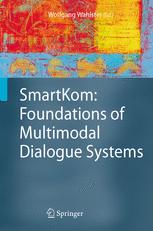

Most ebook files are in PDF format, so you can easily read them using various software such as Foxit Reader or directly on the Google Chrome browser.
Some ebook files are released by publishers in other formats such as .awz, .mobi, .epub, .fb2, etc. You may need to install specific software to read these formats on mobile/PC, such as Calibre.
Please read the tutorial at this link: https://ebookbell.com/faq
We offer FREE conversion to the popular formats you request; however, this may take some time. Therefore, right after payment, please email us, and we will try to provide the service as quickly as possible.
For some exceptional file formats or broken links (if any), please refrain from opening any disputes. Instead, email us first, and we will try to assist within a maximum of 6 hours.
EbookBell Team

4.0
66 reviewsProf. Dr. Dr. h.c. mult. Wolfgang Wahlster is the Director and CEO of the German Research Center for Artificial Intelligence (DFKI GmbH) and a Professor of Computer Science at the Universität des Saarlandes, Saarbrücken. In 2000, he was coopted as a Professor of Computational Linguistics at the same university. In addition, he is the Head of the Intelligent User Interfaces Lab at DFKI.
He was the Scientific Director of the Verbmobil consortium on spontaneous speech translation (1993-2000), the SmartKom consortium on multimodal dialog systems (1999-2003), and the SmartWeb consortium on mobile multimodal access to semantic web services (2004-2008).
He has authored more than 150 technical papers and 6 books on language technology and intelligent user interfaces, and edited many books, among them the Springer titles "Verbmobil: Foundations of Speech-to-Speech Translation", "SmartKom: Foundations of Multimodal Dialogue Systems", and "SemProM: Foundations of Semantic Product Memories for the Internet of Things". His research includes multimodal and perceptive user interfaces, user modeling, embodied conversational agents, smart navigation systems, semantic web services, and resource-adaptive cognitive technologies.
He was awarded the Deutscher Zukunftspreis (German Future Award) in 2001 and he received the Federal Cross of Merit, First Class, the Officer's Cross of the Order of Merit of the Federal Republic of Germany in 2006.
He is the Chief Academic Advisor for Information and Communication Technologies (ICT) in the Research Union of the German Government, he is a member or chair of many key international scientific advisory and governance boards, including the National Institute of Informatics (NII) of Japan, the jury for the European ICT Prize of the European Commission, the Singapore Agency for Science, Technology and Research, the SAP Next Business & Technology Advisory Board, the Center for Advanced Security Research in Darmstadt, the Intel Visual Computing Institute, the Fondazione Bruno Kessler, and the Future Internet Public-Private Partnership of the European Commission.
He is a member of many academies, including the German Academy of Sciences and Literature, Mainz, the Royal Swedish Academy of Sciences, Stockholm, the German Academy of Natural Scientists Leopoldina, Acatech, the Council for Engineering Sciences of the Union of German Academies of Science and Humanities, and the Berlin-Brandenburg Academy of Sciences and Humanities.
He has chaired and given invited talks at the key international conferences in computational linguistics and artificial intelligence, he is a board member of the key AI journals, and he is a Fellow of the Association for the Advancement of Artificial Intelligence (AAAI), the European Coordinating Committee for Artificial Intelligence (ECCAI), and the Gesellschaft für Informatik (GI).